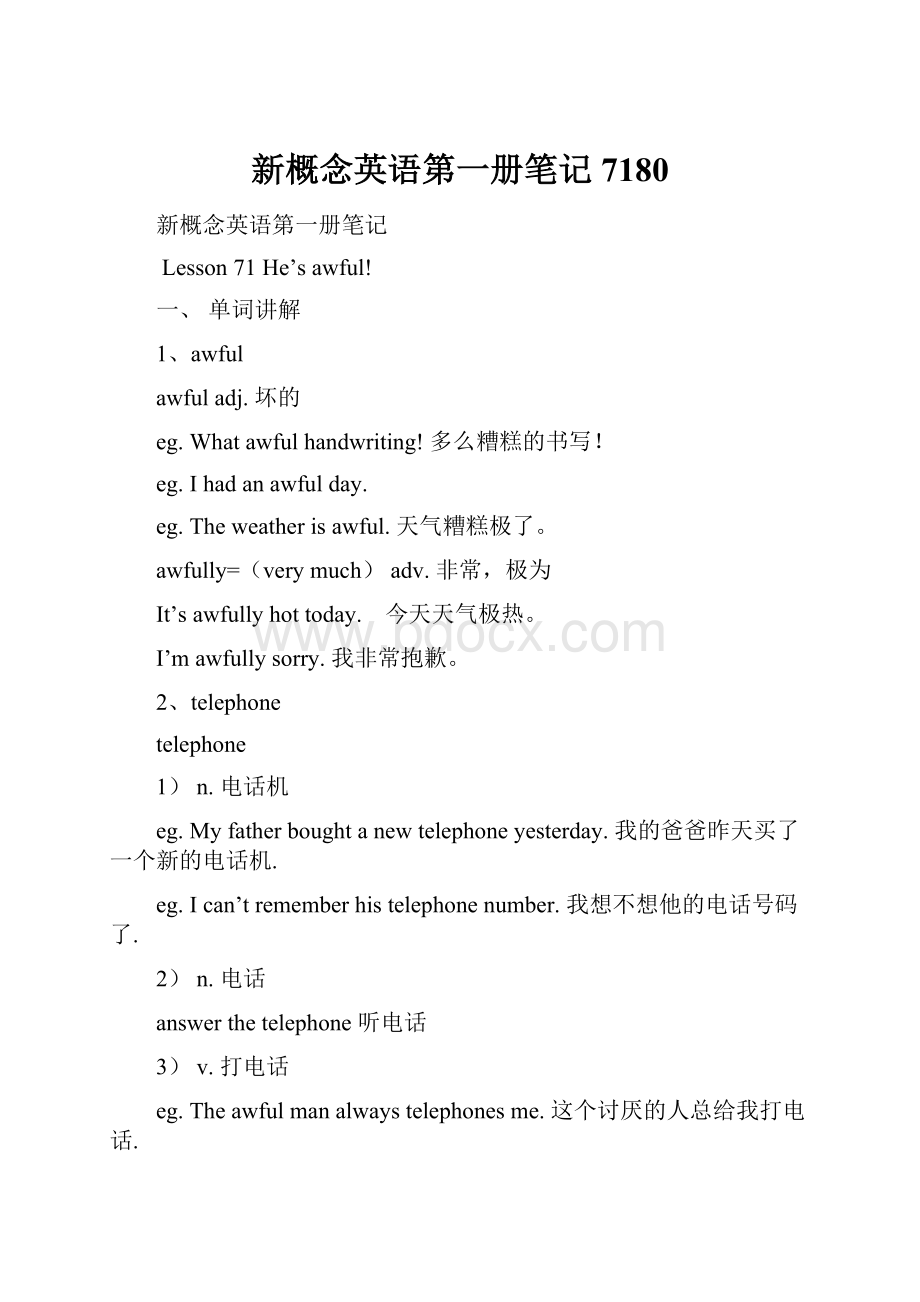新概念英语第一册笔记7180.docx
《新概念英语第一册笔记7180.docx》由会员分享,可在线阅读,更多相关《新概念英语第一册笔记7180.docx(36页珍藏版)》请在冰豆网上搜索。

新概念英语第一册笔记7180
新概念英语第一册笔记
Lesson71He’sawful!
一、单词讲解
1、awful
awfuladj.坏的
eg.Whatawfulhandwriting!
多么糟糕的书写!
eg.Ihadanawfulday.
eg.Theweatherisawful.天气糟糕极了。
awfully=(verymuch)adv.非常,极为
It’sawfullyhottoday. 今天天气极热。
I’mawfullysorry.我非常抱歉。
2、telephone
telephone
1)n.电话机
eg.Myfatherboughtanewtelephoneyesterday.我的爸爸昨天买了一个新的电话机.
eg.Ican’trememberhistelephonenumber.我想不想他的电话号码了.
2)n.电话
answerthetelephone听电话
3)v.打电话
eg.Theawfulmanalwaystelephonesme.这个讨厌的人总给我打电话.
3、time
time
1)n.次(数) 可数名词
基数词+times(复数)几次(二次以上)
threetimes三次/fourtimes四次
once一次/twice两次
eg.Hetelephonedmethreetimesthismorning.他今天上午给我打了三个电话.
序数词+time(单数) 第…次
thefirsttime第一次/thesecondtime第二次/thethirdtime第三次
2) 时间 (不可数名词)
eg.Doyouhavetimenow?
你现在有时间吗?
eg.Idon’thavetimetodoit.我没有时间做它.
allthetime一直
eg.Ilookedveryhardfortheletter,anditwasinmybagallthetime.我使劲儿找这封信,而它一直就在我的书包里.
ontime按时,准时
eg.Thetrainisontime.火车准时到站.
forthetimebeing晢时
eg.Idon’twanttoseehimforthetimebeing.我晢时不想见他.
eg.Forthetimebeing,wecan’tmakethedecision.晢时我们还不能做决定.
4、answer
answer
1)v.对…作出反应; 响应
eg.Whoansweredthetelephone?
谁接的电话?
eg.Marytookafewminutestoanswerthedoor.玛丽拖了几分钟时间才去开门.
2)v.回答; 答复
eg.Idon’tthinkyou’veansweredmyquestion.我认为你没有回答我的问题.
eg.Iwrotehimseverallettersbutcouldn’tgetananswer.我给他写了好几封信,可都没有回音.
answertheletter回信
3)n.答案; 解决办法
eg.DoyouknowtheanswertoQuestion10?
你知道第10题的答案吗?
eg.Thisisoneofthepossibleanswerstotoday’senvironmentalproblems.这是有可能解决当今环境问题的方法之一.
5、last
lastadj.
1)前一次的
lastnight昨夜/lastweek上周/lastmonth上个月/lastsummer上个夏季/lastyear去年
2)最后的,末尾的
thelastSundayinMay五月的最后一个星期天
thelasttime最后一次
6、phone
phonen.电话
7、again
againadv.再一次,又一次
eg.Sayitagain.再说一次.
eg.Whencanwemeetagain?
我们何时再见面?
eg.Don’tdothatagain.下次不可以再这样.
eg.Thismustneverhappenagain.这样的事情以后不可再度发生.
againandagain屡次地,再三地
beoneselfagain(指身体或精神)恢复常态
7、say
sayv.(强调说话的内容)
二、课文讲解
What’sRonMarstonlike,Pauline?
Whatissblike?
可用来询问某人的外貌或品行.
What’sherfatherlike?
她爸爸是怎样一个人?
He’sawful!
Hetelephonedmefourtimesyesterday,andthreetimesthedaybeforeyesterday.他讨厌透了!
他昨天给我打了4次电话.前天打了3次.
1)awful 讨厌的
Idon’twanttospeaktothisawfulman.
2)telephone做动词,打电话 telephoned过去式
3)fourtimes4次
time在英语中作不可数名词时表示“时间”,作可数名词时表示“次数”,once一次、twice两次,三次或三次以上通常用基数词+times表示
4)yesterday昨天
yesterdaymorning昨天上午
5)thedaybeforeyesterday前天/thedayaftertomorrow后天
Iwashedallmyclothesthedaybeforeyesterday.我前天把所有的衣服都洗了。
Theyaregoingtobuyanewcomputerthedayaftertomorrow.他们后天打算买一台新电脑。
Hetelephonedtheofficeyesterdaymorningandyesterdayafternoon.Mybossansweredthetelephone.他昨天上午把电话打到了我的办公室,是我老板接的。
Hetelephonedtheoffice…表示把电话打到了办公室
answerthetelephone=answerthephone接电话
类似的短语如:
answerthedoor=answerthedoorbell开门
Whatdidyoubosssaytohim?
用what对一般过去时提问时,后面的一般疑问句用did引导,谓语动词要用原形。
Hesaid,‘Paulineistypingletters.Shecan’tspeaktoyounow!
’他说:
“波林正在打信,她现在不能接电话!
”
Hesaidsaid是say的过去式,said后面接说话的内容
speaktosb与某人谈话
ThenIarrivedhomeatsixo’clockyesterdayevening.Hetelephonedagain.ButIdidn’tanswerthephone!
then后来、接下来
arrivehome到家 home为adv.修饰动词arrive
telephoneagain又打电话 again为副词,修饰动词telephone
一般过去时的否定式用didn’t,谓语动词要用原形。
Hetelephonedatnineo’clock.
o’clock前需加整数表示整点时间,前面的介词用at.
Isaid,‘ThisisPauline’smother.Pleasedon’ttelephonemydaughteragain!
’
1)Thisis…用在打电话时用
ThisisMaryspeaking.我是玛丽
Thisissbcallingfrom…我是…,我正在…给你打电话
ThisisWendycallingfromBeijing.
问对方是哪位可以说:
Who’sthat,please?
Who’scallingplease?
2)don’tdosth祈使句的否定式,表示不要…
don’ttelephonemydaughter
again表示再…
3)他前天下午5:
30到家。
Hearrivedhomeat5:
30intheafternoonthedaybeforeyesterday.
4)前天下午谁爬树了?
Whoclimbedthetreeintheafternoonthedaybeforeyesterday?
Lesson72Whendidyou…?
Lesson73ThewaytoKingStreet
一、单词讲解
1、week
weekn.周
eg.Therearesevendaysinawee,Monday,Tuesday,Wednesday,Thursday,Friday,SaturdayandSunday.
weekdayn.平日,工作日(星期一至星期五)
onweekdays 在平日,在工作日
weekendn.周末(星期五晚上至星期日晚上)
atweekends在周末
weekly
1)adj.每周一次的
aweeklywage周薪
2)adv.每周一次地
eg.Igototheswimmingpoolweekly.我每周去一次游泳馆。
2、London
Londonn.伦敦
eg.IcomefromLondon.
eg.What’stheclimatelikeinLondon?
eg.WearrivedinLondonyesterday.
3、suddenly
suddenlyadv.突然地
eg.Hesuddenlycamein.他突然进来了。
eg.Suddenly,theyscreamed.他们突然尖叫起来。
4、busstop
busstop 公共汽车站
atthebusstop在公共汽车站
eg.Ioftenseehimatthebusstop.我经常在公共汽车站见到他。
railwaystation火车站
attherailwaystation在火车站
airport飞机场
attheairport在飞机场
5、smile
smile
1)v.微笑 (注意smile与smell发音的区别)
eg.Ismiledatthechildrenandsaid‘hello’.我微笑地与孩子们打招呼。
2)n.微笑
eg.givesbafriendlysmile对某人友好地微笑
laugh出声的笑,大笑
eg.Healwayslaughsloudly.他总是大声地笑。
laughat…嘲笑某人
Don’tlaughatothers.
6、pleasantly
pleasantlyadv.愉快地
eg.Hesmiledpleasantly.他亲切地微笑
pleasantadj.
eg.Theclimatehereisverypleasant.
7、understand
understandv.懂,明白
eg.Thebookisveryhardtounderstand.这本书很难懂。
eg.Idon’tunderstandItalian.
understood(understand的过去式)
eg.MygrandmotherunderstoodRussianwhenshewasalive.我的奶奶在世的时候懂俄语。
8、speak
speakv.讲,说,发言
eg.Hecanspeakthreelanguages-Chinese,EnglishandFrench.
eg.Whoaregoingtospeakatthemeeting?
谁将在会上发言?
speakillofsb说某人的坏话
eg.Don’tspeakillofothers.别说别人的坏话。
spoke(speak的过去式)
eg.Hespokeillofourbossyesterday.他昨天讲我们老板的坏话。
9、hand
handn.手
secondhand二手
eg.Iboughtasecondhandcar.
givesbahand帮某人的忙
eg.Canyougivemeahand?
你能帮我一下吗?
10、pocket
pocketn.衣袋
eg.Ican’tfindthekeyinmypocket.我在衣袋里找不到钥匙。
11、phrasebook
phrasebookn.短语手册,常用语手册
12、phrase
phrasen.短语
13、slowly
slowlyadv.缓慢地
eg.Couldyoudrivealittleslowly?
eg.Theyarewalkingslowlyalongthestreet.
slowadj.
eg.LastweekMrs.MillswenttoLondon.
二、课文讲解
lastweek上周/lastyear去年/lastmonth上个月
Iwentshoppingwithmymotherlastweek.上周我和妈妈逛商店了。
Hewasillyesterday,sohedidn’tgotoschool.
(一般过去时否定句用didn’t,后面的谓语动词要用原形,所以把went变回原形go)
ShedoesnotknowLondonverywell,andshelostherway.
1)know…well对…了解
Doyouknowhimwell?
Idon’tknowItalyverywell.
2)and当“所以”讲,表示结果。
3)lost是lose的过去式
4)losev.丢失
Ilostmykeythedaybeforeyesterday.
5)loseone’sway迷路了
6)way路;方法
onthewayhome在回家的路上
Excuseme.WhichisthewaytotheNo.22busstop?
对不起,打搅一下,请问去22路公共汽车站的路怎么走?
Imustfindawaytosolvetheproblem.我必须找到解决问题的办法。
Suddenly,shesawamannearabusstop.‘Icanaskhimtheway’shesaidtoherself.
suddenlyadv.突然地
sudden(adj.)+ly=suddenly(adv.)
quick(adj.)+ly=quickly(adv.)
saw是see的过去式
Isawaveryprettyladyneartheofficebuildingyesterdayafternoon.昨天下午我在办公大楼附近看见了一位非常漂亮的女士。
Ididn’tseehimalldayyesterday.我昨天一整天都没看见他。
一般过去时的否定时用didn’t,后面的动词要用原形。
1)asksbtheway 向某人问路
CanIaskyouthewaytotherailwaystation?
2)said是say的过去式
3)saytooneself心中暗想
talktooneself自言自语地说
‘Excuseme,’shesaid.‘CanyoutellmethewaytoKingStreet,please?
’
shesaid表示她说,后面一般接说话的内容。
Canyoutellmethewaytotherailwaystation?
用来问路
Tellsbtheway告诉某人(去…的路)
类似问路的表达方法还有:
Couldyoupleasetellmehowtogettotheairport?
Excuseme.HowcanIgettotheNo.11busstop?
Themansmiledpleasantly.
pleasantly是副词,修饰动词smiled.
Shetreatsmepleasantly.她对我很好
(pleasantly修饰动词treats对待)
HedidnotunderstandEnglish!
HespokeGerman.Hewasatourist.
understand动词,表示懂,明白
Canyouunderstandme?
你明白吗?
Hedoesn’tunderstandRussian.
spoke是speak的过去式
CantheyspeakGerman?
Theydon’tspeakJapanese.
Thenheputhishandintohispocket,andtookoutaphrasebook.
put…into…把…放进…里
Thenheputhishandintohispocket.他把手放进了衣袋里。
put的过去式与动词原形一样,在此句中put为过去式。
Putyournewdressintothewardrobe.
takeout拿出来…
Hetookoutaphrasebook.掏出了一本常用语手册。
(took是take的过去式)
Pleasetakeoutyourbook.
take…outof… 把…从…里面拿出来
Hetookagunoutofhisbag.他从包里拿出一把手枪。
Heopenedthebookandfoundaphrase.
openthebook打开书,翻开书
closethebook/shutthebook合上书
Hereadthephraseslowly.
read的过去式和原形是一样的,但读音不同。
原形发[ri:
d],过去式发[red]
slowly缓慢地,副词修饰动词read
Thesechildrenaretired,sotheywalkveryslowly.
Heisdrivingslowlyalongtheroad.
小结:
know…well对…了解
loseone’sway迷路了
saytooneself心中暗想
asksbtheway向某人问路
put…into… 把…放进…里
takeout拿出来…
takeoutof…把…从…拿出来
Lesson74Whatdidtheydo?
一、单词讲解
1、hurriedly
hurriedlyadv.匆忙地
eg.Hewentoutofhisofficehurriedly.他匆匆忙忙地走出了他的办公室。
2、cut
cutv.割,切
eg.Becareful!
Don’tcutyourself.
cut…intopieces把…切成小片/条
eg.Cutthepotatointopieces.把土豆切成小片/条
2、thirstily
thirstilyadv.口渴地
thirstyadj.口渴的
hungryadj.饿的
hungrilyadj.饿地
3、go
gov.走
5、greet
greetv.问候,打招呼
greetsb 与某人打招呼
eg.Weusethephrase‘goodmorning’togreetothersinthemorning.
副词的作用是补充动词的意义。
通过修饰动词我们知道有关句中某个动作的情况,也就是告诉我们某动作是如何、何时、何地等发生或进行的。
副词可以是单个的词(如slowly)或词组(verywell)。
单一副词即有以-ly结尾的如quickly,也有不以-ly结尾的如fast.
形容词向副词的转换一般遵循3个规则:
在形容词后面直接加-ly,如:
quick-quickly
hurried-hurriedly
pleasantpleasantly
以辅音字母加y结尾的形容词,则把-y改成-I,再加-ly,如:
thirstythirstily
happyhappily
形容词与副词的形式相同:
latelate
(adj.)belateforschool
(adv.)comehomelate.
fastfast
(adj.)afastcar
(adv.)runfast
hardhard
(adj.)hardwork
(adv.)workhard
wellwell
(adj.)I’mwell.
(adv.)Iswimwell.
1.他的爸爸今天早晨匆忙地刮胡子,结果把自己严重地割伤了。
Hisfathershavedhurriedlythismorningandcuthimselfbadly.
2.她的儿子拿了一块蛋糕并把它迅速地吃掉了。
Hersontookacakeandateitquickly.
3.我前天下午在街上碰见了她,她非常热情地与我打招呼。
Imetherinthestreetintheafternoonthedaybeforeyester